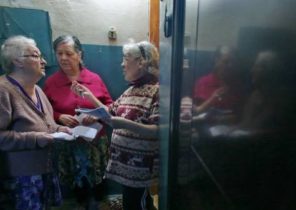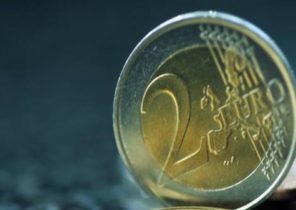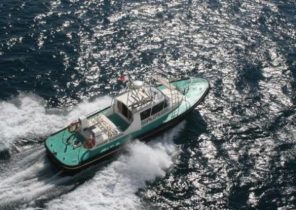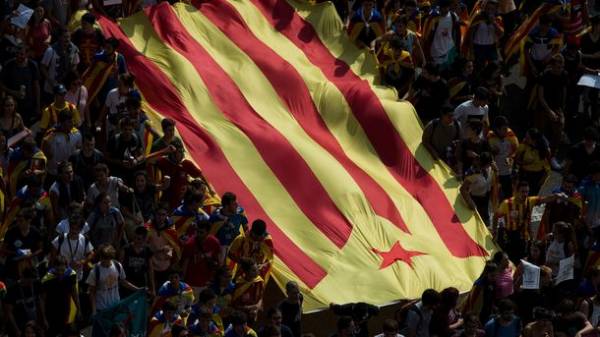
1 October 2017, the government of Catalonia intends to hold a referendum on secession from Spain. This was in the early summer, said the head of the Catalan government, Carles Pujdeme. The planned plebiscite on the single question: “do you Want to Catalonia became an independent state in the form of Republic”. However, it may not take place – the Central government of Spain categorically reject this idea. According to political experts, if the vote is held, the independence of Catalonia it will bring. However, the question from the agenda will not be cleared, so Spain and Catalonia is waiting for the negotiation process.
As told “Today,” political analyst Volodymyr Fesenko, sentiment in favor of independence in Catalonia have a long time and they have different reasons and a long tradition of statehood, and conflicts with Madrid, and economic motivation, as Catalonia is one of the two richest provinces in Spain.
“In addition to a special, Catalan (as they call themselves) identity, language different from Spanish and formalized in the territory of Catalonia, there are also economic motives. Therefore, the majority of the population supports the idea of independence, but you will be able to hold the referendum would depend on whether there is a plan “B” supporters of independence and local authorities”, – said the expert.
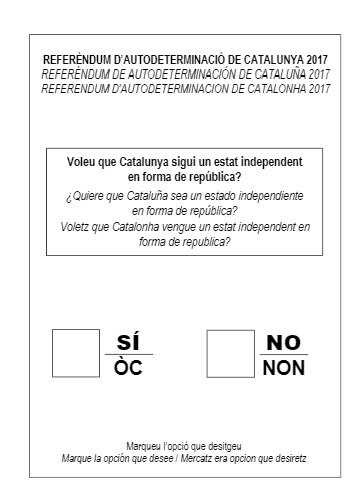
The ballot for referendum in Catalonia. Photo: twitter.com/CasviFactory
So, today it is obvious that Spain will not recognize the results of the referendum, said Fesenko. Moreover, all the places the vote, the Spanish police took control. According to experts, on 1 October will still be attempted is to hold the vote. Moreover, it will depend on the organizers of the referendum and regardless of whether they have a backup plan for it.
“The likelihood of a referendum depends on the determination of the parties and willingness to take on the tough scenario of one party or another, told “Today,” Professor of political science, National University of “Kyiv-Mohyla Academy”, scientific Director of Fund “Democratic initiatives” Oleksiy Haran, a referendum is a tough scenario on the part of the Catalans, then there is defiance, and his blocking – which means the use of force and pressure.”
At the same time, the latest polls show that if the supporters of independence and will benefit, it will not be large, says Haran. Prior to this, their results did not guarantee victory at all. A similar situation occurred with the canadian province of Quebec in 1995 there took place the second referendum on its separation from Canada. Then against it in favor of 50.58% of those who participated in the vote, and although the losing party challenged the results of an independent country is not led.
“The paradox is that among the more, shall we say, educated part of the population more opposed to independence, because they understand all of the negative risks. As for Catalonia, they are that it will not be recognized, at least immediately, the European Union,” – said the expert.
Thus, the EU its position has long formed – if you will form a new state, they will not necessarily automatically become members of the EU, but will undergo the joining procedure. In the case of Catalonia, if it so happens that she, as a separate state, will be eligible for membership in the EU, Spain can easily block, he said. Moreover, businesses realize that they need to stay in Spain, because exports are mostly oriented to EU.
But if Catalonia would still be able to organize the vote, then there is a dilemma – Madrid does not recognize it as the results of the referendum, after which they will begin the showdown, assumes Fesenko. Thus, according to the expert, the experience of the Soviet Union and Yugoslavia shows that if there is a desire for independence, to stop this process extremely difficult.
“So the standoff continues. The question is, when will a new referendum, or whether, after all, to find some compromise on the independence of Catalonia, because of this independence against not only Madrid, but also Brussels,” – said Fesenko.
As noted Fesenko, one of the variants of the compromise is the extension of the financial autonomy of Catalonia, which provides that most of the funds that are transferred to the national Treasury of Spain, would remain in the region. Thus, the Ministry of Economics of Spain declared readiness to discuss the new funding model of Catalonia with the leaders of the region, if they cancel plans for a referendum on independence. At the same time, this decision will be a severe blow to the centralized financial model of the country, the analyst believes. Moreover, if this happens with Catalonia, and other provinces of Spain, for example, Basque Country, too, can follow this model, said Fesenko.
Another scenario that distinguishes the expert – the power, with the intervention of the police. So, theoretically, a possible collision of the Spanish police and supporters of independence, and is one of the worst variants of succession of events, which will only complicate the situation, Fesenko said.
Thus, according to Oleksiy Haran, the holding of a referendum, even if in its course the majority will favor independence, is not the final point in the process. This can be used as an element of pressure on Spain in order to obtain the greatest possible benefit.
“I think that at some point the situation will crash. Even the referendum is not the final result. For example, is a formal Declaration of independence. And then the negotiations begin with Spain and Catalonia, for example, can unite with Spain as a Federation or as a Confederation. They now have the status of Autonomous education. Maybe this status can be upgraded. That is, the referendum can be used to increase the stakes and in order to get as many concessions from the Central government,” – said the expert.
It happened with Quebec. After the referendum of 1995, the province received as many concessions from the Central government of Canada, which at the moment is the issue of independence at least formally exists but is not a practical question of the output of Quebec from the country, says Haran.
Thus, according to Fesenko, to date, the recognition by the Madrid Catalan independence is unlikely, but in the future, possible start of negotiations in order to find some mutually acceptable model of coexistence. But while the confrontation between Catalonia and the Central Spanish government regarding the independence of the first will continue.
History
Independence from Spain Catalonia is seeking more than a hundred years. Thus, in 1979, it received the Autonomous status, the recognition of the Catalan language, Catalans are a nation, separate from the Spaniards. Despite this, the issue of independence from the agenda has not been removed. 2014 was the scheduled national referendum on secession, however, he was banned by the Parliament and the Constitutional court of Spain. Instead, he held a poll about the political future of Catalonia, in which more voters voted for independence. A new referendum, the government of Catalonia appointed on 1 October 2017. However, the Spanish government not only considers the vote illegal, but promised to block it.
“Every step, starting with the announcement of the referendum before the vote, will be blocked by the government,” – said the representative of the government of Spain, iñigo méndez de Vigo, calling the referendum illegal.
On 6 September the Parliament of Catalonia adopted the law on referendum, allowing 1 October to be held in the Autonomous region voting on independence. However, the law was suspended by the Constitutional court of Spain, while Madrid tried to take control of the finances in the region.
September 20, police in Spain have arrested 12 officials of the government of Catalonia and carried out searches in the offices of the regional government in Barcelona in connection with the preparation of Madrid prohibited by referendum. In response to the streets of several cities in Catalonia left thousands of people expressing support for a referendum on independence and demanding the release of detained officials.
SEE ALSO
- A referendum on Catalan independence in Spain raging protests, there were photos
Moreover, Spain will deploy police reinforcements to maintain order and action in day of carrying out of a referendum if he still held. In a statement the Ministry of internal Affairs said that additional forces will support the Catalan regional police, which also has the responsibility to prevent the holding of a referendum.
According to polls, the independence of Catalonia supports 41% of the population of the Autonomous community, 49% oppose. For a referendum on the status of the Autonomous communities are up to 80% of Catalans.

